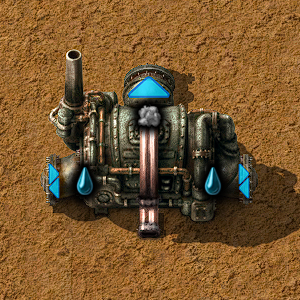Heat exchanger: Difference between revisions
Thrawcheld (talk | contribs) →Calculating steam production rate: technical correction: the figure of 50,000 is "heating" (probably not the correct term) with dimensions of units of water multiplied by temperature, not just temperature |
m Space Age annotation. |
||
| Line 1: | Line 1: | ||
{{Languages}}{{:Infobox:Heat exchanger}} | {{Languages}}{{:Infobox:Heat exchanger}} | ||
The '''heat exchanger''' exchanges heat between a heat connection (normally from a [[heat pipe]] leading to a [[nuclear reactor]] or [[heating tower]]) and [[water]] to produce [[steam]]. | The '''heat exchanger''' exchanges heat between a heat connection (normally from a [[heat pipe]] leading to a [[nuclear reactor]] or [[heating tower]]{{SA}}) and [[water]] to produce [[steam]]. | ||
Heat exchangers produce ~103 steam with a temperature of 500°C every second. | Heat exchangers produce ~103 steam with a temperature of 500°C every second. | ||
| Line 27: | Line 27: | ||
* [[Steam turbine]] | * [[Steam turbine]] | ||
* [[Nuclear reactor]] | * [[Nuclear reactor]] | ||
* [[Heating tower]] {{SA}} | |||
* [[Heat pipe]] | * [[Heat pipe]] | ||
{{ProductionNav}} | {{ProductionNav}} | ||
{{C|Energy}} | {{C|Energy}} | ||
Revision as of 23:25, 15 February 2025
| Heat exchanger |
- Base game
- Space Age mod
|
Recipe |
|||||||||||||
| +++ → | |||||||||||||
|
Total raw |
|||||||||||||
| +++ | |||||||||||||
|
Map color |
|||||||||||||
|
Fluid storage volume |
Input: 200 |
||||||||||||
|
Health |
|
||||||||||||
|
Resistances |
Explosion: 0/30% |
||||||||||||
|
Stack size |
50 |
||||||||||||
|
25 (0.5 stacks) |
|||||||||||||
|
Dimensions |
2×3 |
||||||||||||
|
Energy consumption |
|
||||||||||||
|
Heat output |
|
||||||||||||
|
Maximum temperature |
1000 °C |
||||||||||||
|
Fluid consumption |
|
||||||||||||
|
Mining time |
0.1 |
||||||||||||
|
Prototype type |
|||||||||||||
|
Internal name |
heat-exchanger |
||||||||||||
|
Required technologies |
|||||||||||||
|
Produced by |
|||||||||||||
Object description
The heat exchanger exchanges heat between a heat connection (normally from a heat pipe leading to a nuclear reactor or heating tower![]() ) and water to produce steam.
) and water to produce steam.
Heat exchangers produce ~103 steam with a temperature of 500°C every second.
Heat exchangers will not produce steam until they reach 500°C. The steam produced is exactly 500°C hot, even if the exchanger is hotter. Heat exchangers have a heat capacity of 1 MJ/°C. Thus, they can buffer 500 MJ of heat energy across their working range of 500°C to 1000°C, and require 485 MJ of energy to warm up from 15°C to 500°C when initially placed.
Calculating steam production rate
Heat exchangers produce 103 steam/second. This can be calculated by relying on steam turbine data: A steam turbine consumes 60 steam/second and produces 5.82MW (assuming 500°C steam). This means a single unit of 500°C steam has 5.82MW / (60/s) = 0.097 MJ of energy. A heat exchanger produces 10 MJ a second, therefore it produces 10MJ / 0.097MJ = 103.0927835 steam per second.
The steam production rate can also be calculated using the energy consumption: 1 heat exchanger consumes 10MW, so it's putting 10MJ of energy into heating water/steam per second. To heat up 1 unit of water 1 degree, 200 joules are needed, so the heat exchanger is heating up water by 50,000 unit-°C in total. We observe that this heating results in a temperature increase from 15°C to 500°C, so an increase of 485°C. So the 50,000 unit-°C is divided among 103 units of steam per second, since 50,000 / 485 = 103.09. Since steam is produced from water in a 10:1 ratio, this also means that 10.3 units of water are consumed per second.
History
- 2.0.7:
- 1 Water will now produce 10 Steam in boilers/heat exchangers.
- 0.17.67:
- Heat pipes (also in reactors and heat exchangers) glow with high temperatures.
- 0.15.0:
- Introduced
- Doubled the heat capacity of water from 0.1kJ per degree per liter to 0.2kJ
